International Women’s Day (2023)
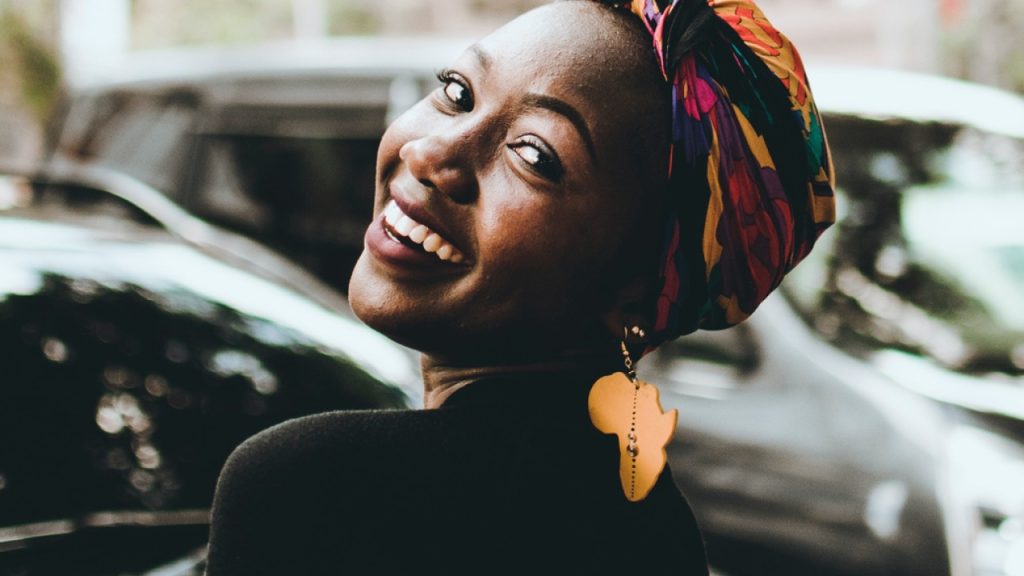
International Day Of Education (2023)

Walk 4 Education: Taking Steps to Advocate for Quality Education
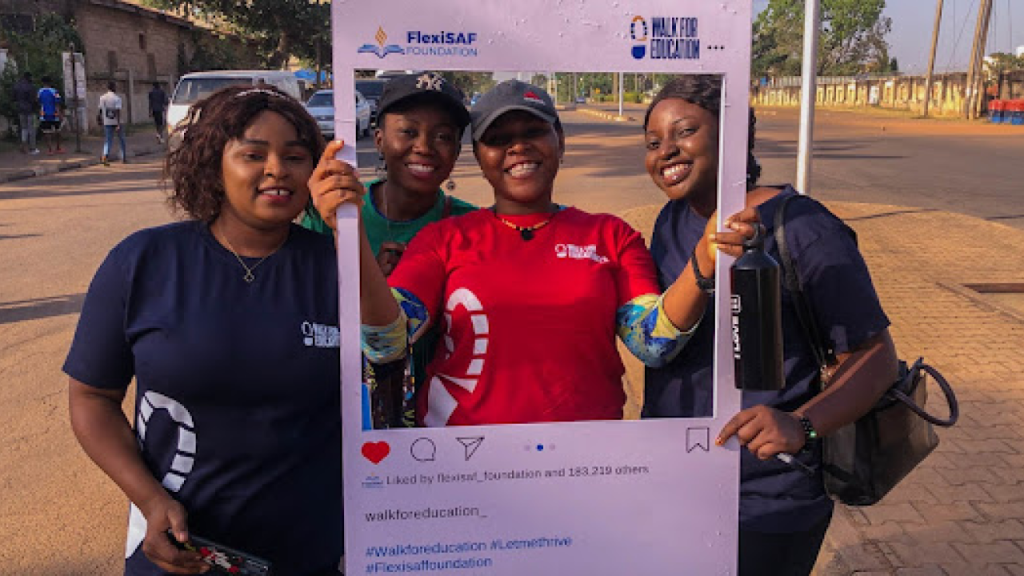
Cynthia Umeh, our Audio and Video Editor, at the Walk4Education event in Abuja, Nigeria by Cynthia Umeh Another fun-filled event! Shades of Us Storytelling Initiative for African People (‘Shades of Us’) was invited for Walk4Education, a fitness and advocacy walk organized by FlexiSAF Foundation to commemorate World Human Rights Day on December 10, 2022, at the International Conference Center. Nothing was better than exercising while advocating for the rights of out-of-school children and wrapping up the 16 days of activism against gender-based violence campaign, which began on November 25, 2022. FlexiSAF Foundation is a non-governmental organization that focuses on providing access to quality education to underprivileged children to solve the scourge of illiteracy and the problem of out-of-school children in Nigeria. Cross-section of participants at the Walk4Education event. Walk4Education was incredibly significant. It was a coming together of many Civil Society Organizations (CSOs) who also provide quality education, advocate for children’s behalf, and call on the government to ensure access to quality alternative education in a safe environment. During the walk, Ms. Amina Abubakar, Executive Director of FlexiSAF Foundation, gave a critical message. “See how much money is going into politics? If the same amount of money and attention is given to education, we believe we won’t have to spend much on defense and others.” She also said FlexiSAF Foundation has been working to take out-of-school children back to school through its numerous programs, and the walk was an opportunity to showcase the progress made by the children in their programs. Children walking for education. It was a long, energetic walk. You would think people would be tired from walking, but it was quite the opposite. We had fun while playing a role in promoting education. Education is essential to the growth and development of Africa, Africans, and people of African descent. It is one of the core global goals that we tell stories around, and we are constantly seeking opportunities to partner with other organizations doing the same thing. Our highlight was seeing children actively participating in the walk, unveiling the Walk4Education performance, and singing and dancing during and after the walk. This shows that even children are tired of the lack of education for their fellow peers. More photos from Walk4Education There was a small gathering after the walk. Children sang, and a documentary on the FlexiSAF Foundation project in different communities under their AccLearn program was screened. A beneficiary also came up to share her story. Mr. Laban from PLAN International shared, “Education must be put on the agenda of whoever is coming into office. Civil society should design the agenda for education for whoever is coming into office”. Mr. Umar, from the Office of Humanitarian Affairs, also gave a goodwill message. “If children are out of school for long, it has no good effects on the country.” He congratulated everyone for coming and is ready to work to reduce the number of out-of-school children. At the end of the event, FlexiSAF Foundation announced the launch of Young Education Advocate (YEA) and encouraged everyone to sign up for the program. More photos of Shades of Us walking for education.
Fun Times to Commemorate the Global Week to #Act4SDGs
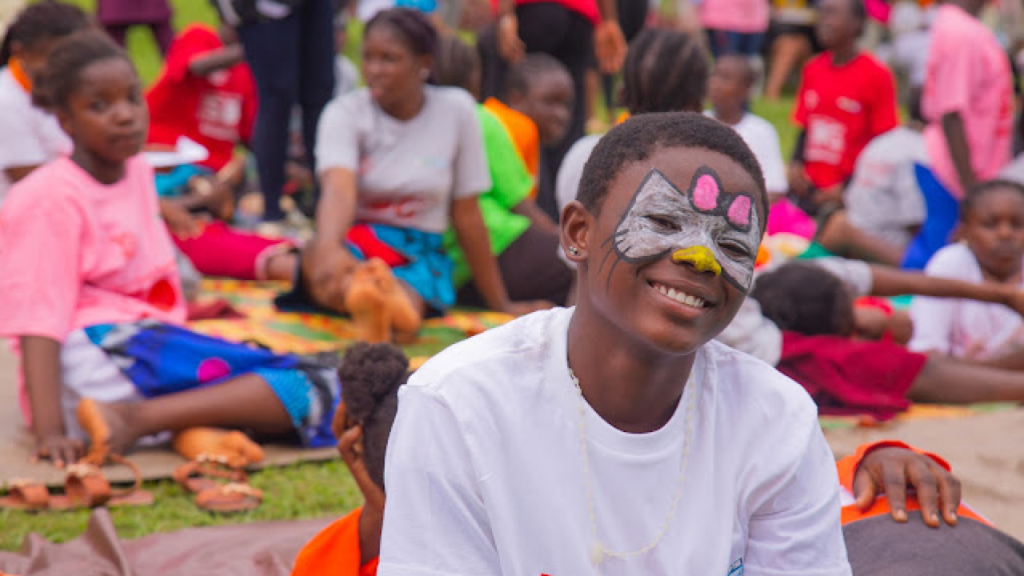
Young advocate for the Sustainable Development Goals. As an organization, we can be serious but…we also love to have a good time. When we heard about the Sustainable Development Goals (SDG) hangout organized by Connected Development (CODE) to commemorate the Global Week to #Act4SDGs, we were excited. Hangout equals fun, right?CODE was launched in 2012 to improve public governance in Nigeria and across Africa by empowering marginalized communities to demand high levels of accountability and transparency from the government. Through its Follow The Money (FTM) Initiative, CODE enables citizens to demand better from their government and directly influences government policy to ensure public funds work for public good. Shades of Us has followed the activities and been an ardent fan of CODE for years and we were excited to be part of the celebration of their decade of impact in mobilizing communities to #FlipTheSwitch for the SDGs. On September 17, 2022, we donned our excitement caps and attended the SDG hangout. Sights from the SDG hangout. The hangout was fun filled and we got to meet various individuals and learned of organizations working on similar SDGs projects as we do: no poverty; zero hunger; good health and wellbeing; quality education; gender equality; clean water and sanitation; decent work and economic growth; reduced inequalities; climate change; peace, justice and strong institutions; and being open to partnerships for the goals. One of the key highlights was seeing children explain the SDGs and honestly, quite better than many adults. Children are not just the future of the SDGs…or any form of development: they are the present. We must be deliberate in including children, adolescents and young people to meaningfully contribute to the global goals and envision a better community, nation, continent and the world at large. We were especially excited to just unwind, dance, eat and enjoy the ambience of activists and advocates taking a breather. Imagine our surprise when the Nigeria Idol star, Francis was called to the podium. He serenaded us with two new songs and suffice to say, many women wanted to be married at that moment. When the event was over, we were ecstatic to get back to work on the SDGs. There is, after all, a lot of things to achieve as we work towards 2030. Check out more pictures here. How did you commemorate the Global Week to #Act4SDGs?
J Blood Match: An App to Connect Blood Donors and Recipients
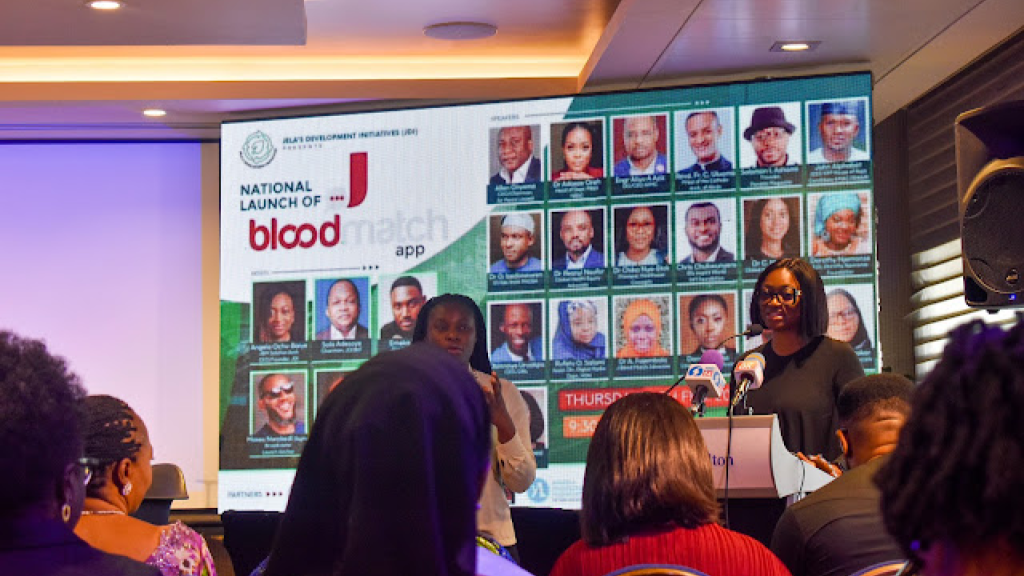
Angela Ochu-Baiye, CEO of Jela’s Development Initiatives Addressing Guests During the J Blood Match by Cynthia Umeh and Nkem Nwachukwu Jela’s Development Initiatives (JDI) launched the J Blood Match App, an artificial intelligence application that connects voluntary blood donors to recipients using their blood type and location, on February 9, 2023. The app allows registered blood donors to request for another blood donor to come to the aid of a recipient in the hospital. It requires you to register on the artificial intelligence application on Telegram or Facebook Messenger by following the prompts. Afterwards, you will begin to receive requests, have the opportunity to accept them and donate blood at a registered hospital.The launch was held at the Transcorp Hilton Hotel. There were representatives from the National Identity Management Commission (NIMC), the Nigeria Police, the Nigeria Security and Civil Defence Corps (NSCDC), the National Blood Service Commission, Shades of Us and other organisations. While presenting the welcome address, Angela Ochu-Baiye, the CEO of JDI, shared why she came up with the idea to create a database for blood donors. “The app connects blood donors using their blood type and their location and currently has 952 users in the country.” Dr Adaeze Oreh, the Head of Department, Planning, Research and Statistics, at the National Blood Service Commision expounded on the gap in the demand and supply of safe blood in Nigeria. She commended the JDI for using technology to drive the importance of blood donation in Nigeria. Similarly, a goodwill message from Aliyu Abubakar Aziz, the Director General of the National Identity Management Commission, focused on the importance of data to blood transfusion management. Mr John Alphabet, a Nigerian vying for elective office, connected the interrelationship between model health technology and politics and governance. And the manager of Africa Independent Television (AIT) presented a speech on the value of the media in driving social change and shaping the perception of people to become more amenable to donating blood wherever they are. Cross Section of Presentations at the J Blood Match App Following the speeches were statements of lived experiences from individuals who have benefited from using the J Blood Match App. There were combined experiences from both blood donors and blood recipients. One of the recipients who received blood over twenty years ago also has a son who is autistic, has Attention-Deficit/Hyperactivity Disorder (ADHD) and other health challenges because he couldn’t receive blood when he needed it. The next lived experience was from an advocate from South Africa who joined virtually. Most of the lived experiences are from the J Blood March advocacy programme. The advocacy programme was created to train individuals who go out and teach people on blood donation, clear up any myths and help people become blood donors. This was what helped them build a database of over 900 blood donors across the country. Allen Onyema, the Chairman of AirPeace, gave a keynote address that emphasized making the blood transfusion processes and systems easily accessible and devoid of myths that hinder the life-saving attributes of blood donation. JDI received partnership support in terms of airtime from AIT and advertisement on all flights of AirPeace to advertise the J Blood Match Initiative. Cross Section of Guests at the J Blood Match App Solomon Izang Ashoms proposed promoting J Blood Match as an innovation for export. From available statistics, 7 million Africans require blood donations daily. This is a huge number of lives that needs to be saved and everyone has a responsibility to become advocates for safe and easy access to blood. Beyond health, safety, business and politics, blood donations are also moral, as Reverend Father Chinenye Oluoma from the Catholic Archdiocese of Abuja explained. He spoke about blood donation as a pious and charitable act. He noted that blood donation is an act of justice that leads to the prevention of deaths and upholding the sanctity of life. He also offered a media partnership to the J Blood Match on Radio Maria Abuja. There was a panel discussion that focused on opportunities for blood donation and lessons to be taken from such advocacy initiatives. Panelists emphasised that the best way to drive advocacy is to make the learning process easy and minimize, as much as possible, the use of technical terms that may confuse individuals. The advocacy chain which is made up of the message, messenger and the medium must always be recognized by stakeholders in the advocacy process. The need for health equity was also noted. Cross Section of Panelists at the J Blood Match App Recommendations from the panel session: Communication messaging needs to factor in accessibility of people living with disabilities and health facilities should be disability compliant. The glossary of disability should me made to aid persons living with disability Government also has a role to play in ensuring that fees for screening blood are waived, especially for victims of gender based violence. This would help such victims have easier access to safe blood transfusion The importance of storytelling in the blood advocacy drive was also emphasised. Shades of Us believes that the launch of the J Blood Match is a crucial step to addressing some of the problems associated with blood donations in Nigeria: especially during surgeries and emergencies. The organization urges the government to adopt this application into its health systems. There is a room for technology funders to scale up the technology so everyone across the thirty six States and 774 local governments of Nigeria. There is also an opportunity to scale this up across Africa. The time to do this is now. Learn more about the app here, sign up and share with your family and friends. Donating blood is saving lives.
‘Love Your Lemons’ Webinar
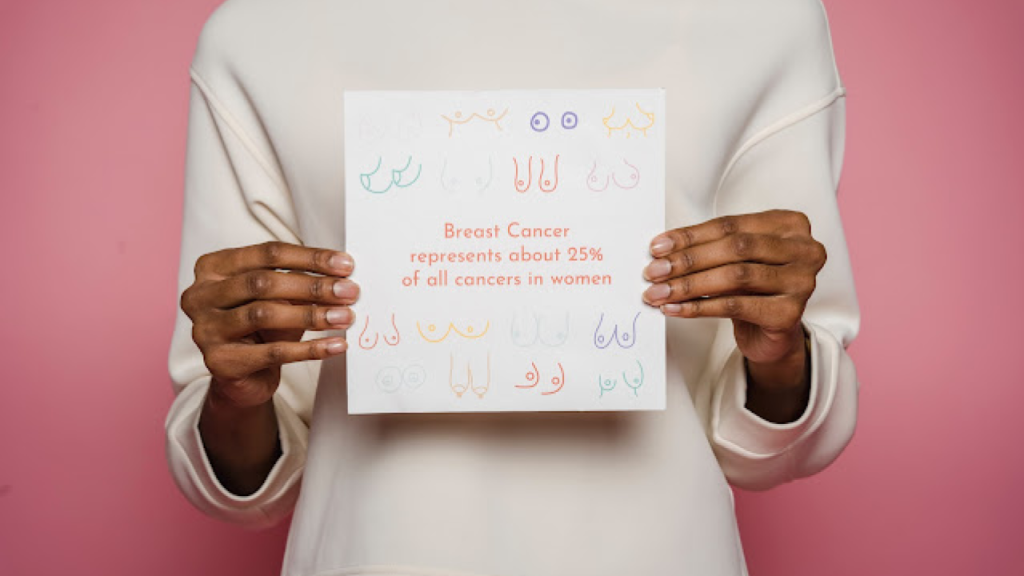
Photo by Klaus Nielsen by Safiyah Salawu Ibrahim On October 27, 2022, Shades of Us Storytelling Initiative for African People (Shades of Us) attended the Love Your Lemons Webinar, an event organised by the Medicaid Foundation in Abuja during a week-long event geared towards raising breast cancer awareness. The goal was to raise awareness about breast cancer and to encourage women across all age groups to have regular visits to the hospital because early detection of cancer is vital to its management. Shades of Us is constantly raising awareness about cancer using our digital media platforms. We have used fiction to promote the awareness of breast cancer and are in preliminary stages of developing a film about cervical cancer. This ties into the Sustainable Development Goal (SDG) target 3.3 – ensure a reduction of mortality from non-communicable diseases – which is one of our adopted goals. The webinar was anchored by Dr. Chito Nwana of Tabitha Medical Center, Abuja, and hosted by Her Excellency, Dr. Zainab Shinkafi-Bagudu, the Founder of Medicaid Foundation. Dr Zainab opened the event by explaining some major symptoms of breast cancer. They include: A lump in the breast or around the armpit. Abnormal or foul smelling discharge from the nipples. Thickening or swelling of a part of the breast. Irritation or dimpling of breast skin (orange skin). Soreness or flaky skin in the nipple area or the breast. Pulling or retraction of the nipple or pain in the nipple area/areola. While breast cancer is sometimes found after symptoms appear, many women with breast cancer have no symptoms. This is why regular breast cancer screening is so important. Different tests can be used to look for and diagnose breast cancer. If the doctor finds an area of concern on a screening test , or if symptoms are present that could mean breast cancer, more tests need to be carried out. Screening and Tests Breast Self-Examination: This is a method of self-examination using the pads of one’s fingers on the left hand to gently rub around the right breast, making sure to cover the entire breast area and armpit. Using light, medium, and firm pressure, squeeze the nipple, check for discharge and lumps. Repeat these steps for the left breast. Mammogram: Mammograms can be used to look for breast cancer, either as a screening test in women without symptoms or in women who have symptoms that might be from cancer. A mammogram can often find or detect breast cancer early, when it is small and even before a lump can be felt. This is when it’s likely to be easiest to treat. Mammograms can often show abnormal areas in the breast. They can’t tell for sure if an abnormal area is cancer, but they can help health care providers decide if more testing is needed. Breast Ultrasound: Ultrasound is not normally used as a routine screening test for breast cancer. But it can be useful for looking at some breast changes. Ultrasound can be especially helpful in women with dense breast tissue, which can make it hard to see abnormal areas on mammograms. Cancer Care in Nigeria Medicaid foundation is not only raising awareness but is also doing a lot of advocacy for cancer care to be reformed in Nigeria. Working with policy makers to ensure cancer care and treatment is included in the annual national budget. A round of chemotherapy in the National Hospital goes for almost One Million Naira, which is too expensive for the average Nigerian. However, many Federal and State healthcare facilities do not have the equipment to diagnose and manage cancer. The absence of credible and inclusive health insurance companies also contribute to the high cost of cancer treatment. While the American government has ventured into high-end, cutting edge research for cancer and related clinicals, it is quite unfortunate that screening is still the trending cancer topic in Nigeria. This alone has created a gap in the effectiveness of cancer care in Nigeria. Dr. Zainab further urged that with the ongoing global research on cancer, black people should be included in clinical trials. This is to better understand the kind of treatments, drugs and doses that are suitable for black people while treating and managing cancer so that we can have the right precision. Dr. Chito encouraged the attendees to not only be listeners but to also be messengers to spread awareness in our local communities about breast care and screening. When cancer is detected early, it is cheaper to treat and manage. The more advanced the cancer becomes, the more expensive the treatment becomes as well. She further explained that a black woman’s breast is usually dense and it is difficult to detect abnormalities without a mammogram or ultrasound. This calls for a need to advance cancer care in Nigeria, and certain technologies like a 3D Mammogram that can capture the breast from angles, need to be in our healthcare facilities on all levels. It begs reiterating that the major advantage of advancing diagnosis is early detection of cancer. Aside from equipment and technology, it is no news that Nigeria has a shortage of medical professionals. There is a huge gap between cancer patients and oncologists. Most doctors who end up diagnosing cancer are mostly general practitioners who lack the skill and experience to handle cancer cases. More often than not, they end up misdiagnosing or mistreating their patients. So Nigeria lacks the quality of cancer care when it comes to personnel as well. Conclusion There is an urgent need for Primary Healthcare Centres to also create awareness and have the necessary equipment for routine screening for women in local communities. The government also needs to invest in improving the healthcare system on all levels to ensure accessible quality healthcare. More research on cancer needs to be carried out in Nigeria and the urgent rehabilitation of the National Cancer Centre in Abuja. Civil societies and Non-Governmental Organizations (NGOs) need to shift from only raising awareness to working with policy makers
Global Town Hall 2022

UN SDG Action Awards Ceremony

HeForShe Summit

The Future of Health Conference: Investing in Nigeria’s Future
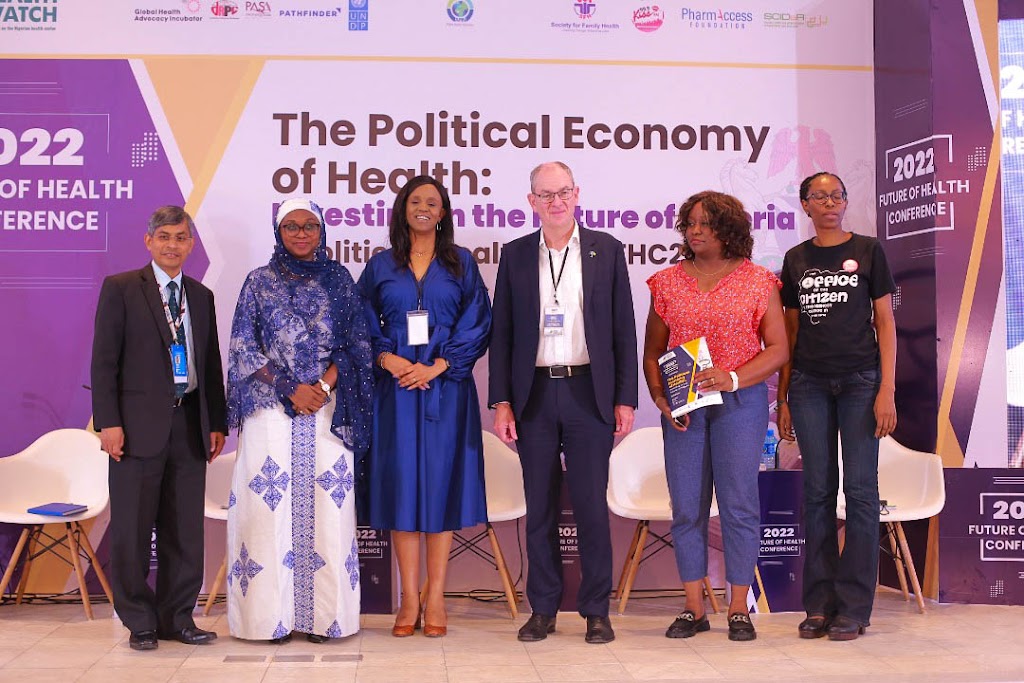
Group photo after the second-panel session at the Future of Health Conference in Abuja.Image Credit: Nigeria Health Watch by Adetayo Adetokun The Future of Health Conference is an annual conference hosted by Nigeria Health Watch. The conference aims to provide a visible platform for critical stakeholders in healthcare, finance, politics, and other allied sectors to discuss the factors that influence Nigeria’s health policies; how political, social, and economic factors shape individual and population health outcomes; health service development within the economic and political context; and how to create a national health service that meets the needs of all Nigerians. The 2022 theme was “The Political Economy of Health: Investing in Nigeria’s Future”. We attended the conference and shared crucial discussions about health and the investments in this sector that are required to improve the overall health, well-being, and productivity of Nigerians. We believe that healthcare is a human right, and everyone should have access to good healthcare and universal coverage. We also recognize the role good healthcare plays in the development of African communities. The government of every country has a huge role to play in ensuring that every citizen of their country has access to good healthcare. This conference allowed us to improve our knowledge of ways to reduce the number of deaths in the communities that are hardly reached with quality and sustainable healthcare. This conference also spotlighted one of the main issues we are committed to ending – maternal and pediatric health. In many communities, women and children are often at the bottom of the economic chain, and it is difficult for them to access the healthcare services they require. There were so many moments at the conference that resonated with our work and the actions we hoped to take. Welcome Address Vivianne Ihekweazu, Managing Director of Nigeria Health WatchImage Credit: Nigeria Health Watch The welcome address was delivered by Vivianne Ihekweazu, the Managing Director of Nigeria Health Watch. In her address, she stated that the Future of Health conference was started to reinforce the importance of universal health coverage. She mentioned the importance of government and political leaders’ intervention in the healthcare ecosystem. She reminded citizens that we are saddled with the responsibility of ensuring our political leaders are held accountable for the availability of healthcare infrastructure and its proper management. Keynote Speech Professor Olumide Ayodele during his keynote speech.Image Credit: Nigeria Health Watch The keynote speech was delivered by Professor Olumide Ayodele on behalf of Ben Akawueze, the Managing Director of the Budget Office of the Federal Government of Nigeria. He spoke about the importance of monitoring the financial expenditure allocated to each government project. “It is not the amount of money that is being spent. But, its impact”, he said. He expounded on the importance of advocacy in the healthcare financing sector and why we need more people to look into how budgets are allocated and utilized. On healthcare financing, he emphasized that it is the responsibility of both government and sub-national entities to ensure that healthcare is financed, as the government can only finance some of the healthcare projects due to the low revenue generated. After this keynote session, there were three-panel sessions: The Economy of Health — the economic cost of poor health prioritization and the economic benefits of prioritizing health Politics and Health — charting a course of action to set Nigeria on course for achieving UHC. Political Leadership in Health — the impact of leadership on healthcare at the sub-national level. First-panel session: The Economy of Health — the economic cost of poor health prioritization and the economic benefits of prioritizing health. The first-panel session had Prof. Obinna Onwujekwe, a Member of the European Commission-funded Eval-Health project fr. Sarah Alade, Special Adviser to the Nigerian President on Finance and Economy; Dr. Onoriode Ezire, Se; or Health Specialist, at World Bank Nigeria; Dr. Ola Brown, Founder, Flying Doctors Incorporated; and Dr. Habib Sadauki, National President, Society of Gynaecology and Obstetrics, Nigeria. Dr. Ola Brown making her points during the first-panel session.Image Credit: Nigeria Health Watch Dr. Ola Brown spoke about why young people leave the country in their thousands. She said the lack of good healthcare infrastructure and viable opportunities, as well as the persistent insecurity in the country, were some of the reasons young people left the country. She believes that when healthcare problems in Nigeria are solved, all other problems will be easily solved. Dr. Sarah Alade making her points during the first-panel session.Image Credit: Nigeria Health Watch Dr. Sarah Alade pointed out that healthcare is a pillar for development in every country, and we cannot mention healthcare without considering sustainable development goals. She hopes the government and private entities will continue to donate to healthcare development in the coming years. Dr. Habib Sadauki sharing his thoughts during the first-panel session.Image Credit: Nigeria Health Watch Dr. Habib Sadauki articulated the importance of investing in family planning and women’s health in general. He said that the low rate of accessibility to family planning for Nigerian women has affected our economy greatly as many families continue to give birth to more children than they can cater for. “For every dollar invested in family planning, there is a return of three dollars.” This has been proven across many countries and regions. Dr. Onoriode Ezire sharing his thoughts during the first-panel session.Image Credit: Nigeria Health Watch Dr. Onoriode Ezire called the audience to reflect on the deplorable state of healthcare in Nigeria. He said the reason we have very terrible healthcare can easily be traced to the low Gross Domestic Product in Nigeria, which is one of the lowest in Africa. “Due to this low GDP, Nigeria has one of the highest mortality rates in Africa.” He emphasized that the best way to improve healthcare in Nigeria is to ensure that all hands are on deck. Prof. Obinna Onwujekwe sharing his thoughts during the first-panel session.Image Credit: Nigeria Health Watch Prof. Obinna Onwujekwe spoke about the importance of an immaculate system of governance where everything is plain and fair so citizens can adequately monitor the activities of the government and

